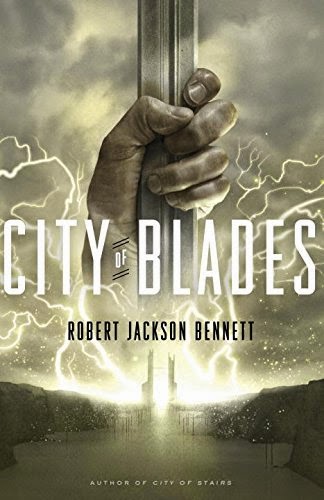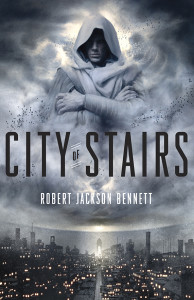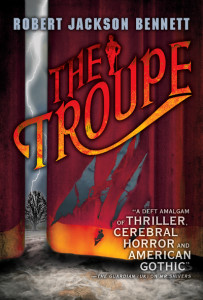From circus life, to southern Americana, Bennett’s work is best known for examining the every day through a fantastical and revealing lens. “I saw notes of [Neil Gaiman] throughout,” said Justin Landon of Bennett’s The Troupe. “In the themes of gods and men, and the hidden worlds behind the curtain of reality. The City of Stairs, however, is Bennett’s first “secondary world” fantasy. A novel of “of statesmanship, spycraft, and diplomacy, set among ruined miracles and the fading divine,” as he described to Lightspeed Magazine’s Patrick J. Stephens.
City of Stairs was a book that kind of came in a flash,” Bennett said when I asked him to describe his latest novel. “I remember it very distinctly: I’d been reading Dark Star by Alan Furst, a terrific spy novel about a KGB agent in Nazi Germany, and I thought the Eastern European perspective was a really interesting and rare one: it explored how Poland was just wildly unprepared, operating as if this was still the 19th century, with 20th century warfare bearing down on them.
“And one day I was vacuuming the house and Turner Classic Movies was on, showing a 1930s satire about the nobility of a fictional Eastern European nation, and I thought it’d be interesting to write about a diplomat trying to navigate this densely complicated and Balkanized area, someone dealing with both the dreadful tedium of bureaucracy while also juggling the stressful, nervous-breakdown-inducing spycraft going on in the background.
“And I remember thinking, ‘Well, all these countries are mad at this diplomat. But why?’
“And the answer came back immediately: ‘Why, because her country killed all their gods, of course.’ And that was that.”
An atmospheric and intrigue-filled novel of dead gods, buried histories, and a mysterious, protean city—from one of America’s most acclaimed young SF writers.
The city of Bulikov once wielded the powers of the gods to conquer the world, enslaving and brutalizing millions—until its divine protectors were killed. Now Bulikov has become just another colonial outpost of the world’s new geopolitical power, but the surreal landscape of the city itself—first shaped, now shattered, by the thousands of miracles its guardians once worked upon it—stands as a constant, haunting reminder of its former supremacy.
Into this broken city steps Shara Thivani. Officially, the unassuming young woman is just another junior diplomat sent by Bulikov’s oppressors. Unofficially, she is one of her country’s most accomplished spies, dispatched to catch a murderer. But as Shara pursues the killer, she starts to suspect that the beings who ruled this terrible place may not be as dead as they seem—and that Bulikov’s cruel reign may not yet be over.
“It felt like one of those rare watershed moments, and I instantly pictured this delicate,” Bennett described. “Highly political global state, where one empire has been dashed and another one’s arisen, but history weighs down on everything that’s happening in every moment. The gods are dead, sure, but if one nation remembers them, are they really gone? If they are still observing the practices of an absent god, can that god truly be said to be absent? And can anyone accurately remember history? Doesn’t the process of remembering something, by default, change it, warp it, twist it to your own ends?
“And that was what the book became.”
If this novel is a departure for Bennett, it comes with a lot of challenges and expectations for the Shirley Award winning author. Early buzz, however, is mighty fine. “[City of Stairs is] a rich, layered, thoughtful story, full of gods and magic and characters that feel unflinchingly true,” said Jim C. Hines.
“City of Stairs is a book about how the past is both ever-present, and inaccessible, about absent gods who still subtly influence the modern world, despite their absence,” Bennett described to me. And, if that doesn’t get you excited, well, then… Bulikov help you. City of Stairs is due for release on September 9th, 2014 from Broadway Books.




